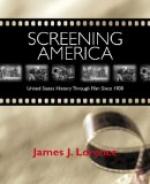|
This section contains 390 words (approx. 2 pages at 300 words per page) |

|
At heart 1900 is elegiac, and what it inscribes on its large historical canvas is a lament, in which something akin to a mourning for a lost wholeness plays a dominant role. Consider the temporal unfolding of the film: a world of childhood and unquestioned patriarchy; its interruption by war, class struggle and fascism; and a liberation which is a false dawn. Or the basic dualistic structure: two grandfathers and their two grandchildren (and for one of these grandchildren two 'fathers'), two heroines, two social classes (landowners and peasantry) and two social forces (socialism and fascism)—with the duality becoming more antagonistic as the film proceeds. At the beginning there is harmony; in the centre, conflict; and at the end, uncertainty. If the theme of a 'golden age' is traditional to pastoral, the use alongside it of an explicit mechanism of splitting adds an unexpected psychoanalytic dimension.
The splitting...
|
This section contains 390 words (approx. 2 pages at 300 words per page) |

|


